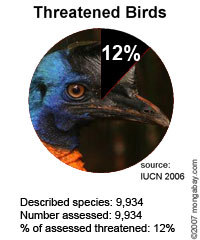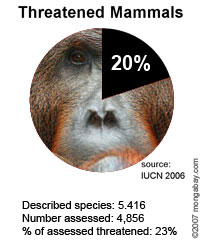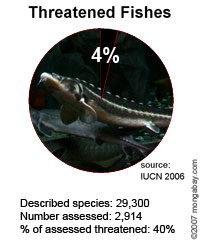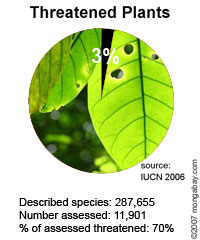Sachs says biodiversity extinction crisis avoidable
Sachs says biodiversity extinction crisis avoidable
Rhett A. Butler, mongabay.com
March 26, 2007
In a Guardian editorial published last week, Jeffrey Sachs called for action to stem mounting losses of global biodiversity.
Sachs, director of the Earth Institute at Columbia University and Special Advisor to United Nations Secretary-General Ban Ki-Moon, said humans are the primary cause for depletion of the world’s biological richness.
“As a species, human beings have a major self-control problem. We humans are now so aggressively fishing, hunting, logging, and growing crops in all parts of the world that we are literally chasing other species off the planet. Our intense desire to take all that we can from nature leaves precious little for other forms of life.”
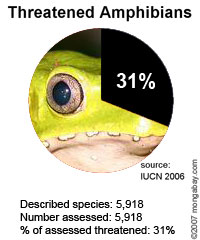
|
Sachs said the current system for conserving biodiversity, the Convention on Biological Diversity, has been unsupported by most governments.
“Unfortunately, like so many other international agreements, the Convention on Biological Diversity remains essentially unknown, un-championed, and unfulfilled. That neglect is a human tragedy,” he wrote. “For a very low cash outlay – and perhaps none at all on balance – we could conserve nature and thus protect the basis of our own lives and livelihoods. We kill other species not because we must, but because we are too negligent to do otherwise. ”
He cited bottom trawling, tropical rainforest clearing for pastureland and food crops as examples of activities that provide fleeting economic gains, but are costly in the long-run. He said they should be slowed or banned outright.
“Because these activities’ costs are so high and their benefits so low, stopping them would be easy Bottom trawling should simply be outlawed; it would be simple and inexpensive to compensate the fishing industry during a transition to other activities,” he wrote.
“Forest clearing, on the other hand, is probably best stopped by economic incentives, perhaps combined with regulatory limits. Simply restricting the practice of land clearing probably would not work, since farm families and communities would face a strong temptation to evade legal limits. On the other hand, financial incentives would probably succeed, because cutting down forest to create pastureland is not profitable enough to induce farmers to forego payments for protecting the land.”
Sachs supports the creation of a global fund for avoided deforestation, first proposed by a coalition of tropical forest countries, which would compensate small farmers for preserving forest areas.
“A well-designed fund would slow or stop deforestation, preserve biodiversity, and reduce emissions of carbon dioxide the burning of cleared forests. At the same time, small farmers would receive a steady flow of income, which they could use for micro-investments to improve their household’s wealth, education, and health.”
Returning to marine areas, Sachs called for the establishment of marine protected areas in which all damaging activities would be prohibited. He says these areas would serve as refuges for recovery of ecologically and economically important species.
Sachs said that scientific input is key to conservation efforts.
“We also need a regular scientific process to present the world with the evidence on species abundance and extinction, just as we now have such a process for climate change. Politicians don’t listen very well to individual scientists, but they are forced to listen when hundreds of scientists speak with a united voice.”
He concluded by urging a world framework on climate change by 2010, noting that many species will suffer from the effects of global warming.
He says all the targets are achievable by 2010.
“They are affordable, and in each case would ultimately deliver large net benefits. Most importantly, they would allow us to follow through on a global promise. It is too painful to believe that humanity would destroy millions of other species – and jeopardise our own future – in a fit of absent-mindedness. ”
This article is based on an editorial by Jeffrey Sachs that appears on the Guardian Unlimited’s “comment is free” site.



